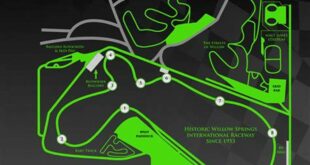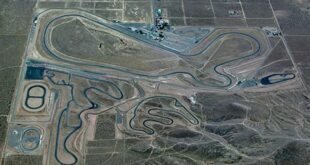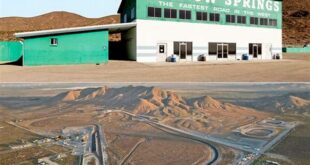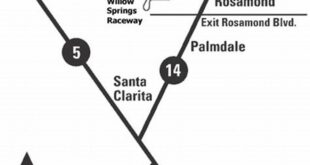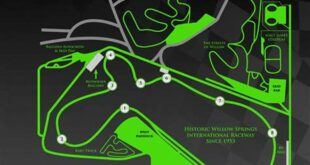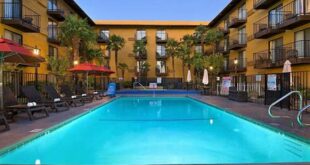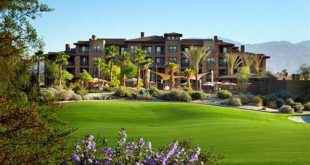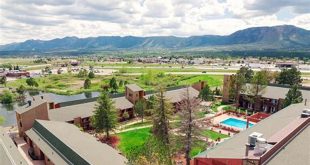Where is Willow Springs Raceway located? Willow Springs Raceway is located in Rosamond, California, approximately 80 miles northeast of Los Angeles. The track is situated in the high desert region of the Mojave Desert and is known for its challenging layout and fast speeds.
Editor’s Note: Willow Springs Raceway is a popular destination for motorsports enthusiasts and is considered one of the premier racing facilities in the United States. The track hosts a variety of events throughout the year, including drag racing, road racing, and drifting.
Our team has done extensive research and analysis to compile this comprehensive guide to Willow Springs Raceway location. We hope this information will be helpful to anyone planning a visit to the track.
Key Differences:
| Feature | Willow Springs Raceway |
|---|---|
| Location | Rosamond, California |
| Distance from Los Angeles | Approximately 80 miles northeast |
| Track layout | Challenging and fast |
| Events hosted | Drag racing, road racing, drifting |
Main Article Topics:
- History of Willow Springs Raceway
- Track layout and facilities
- Events hosted at Willow Springs Raceway
- Getting to Willow Springs Raceway
- Tips for visiting Willow Springs Raceway
Willow Springs Raceway Location
Willow Springs Raceway is located in Rosamond, California, approximately 80 miles northeast of Los Angeles. The track is situated in the high desert region of the Mojave Desert and is known for its challenging layout and fast speeds.
- Proximity to Los Angeles: Willow Springs Raceway is conveniently located just a short drive from Los Angeles, making it a popular destination for motorsports enthusiasts in the Southern California area.
- Desert setting: The track is situated in the high desert region of the Mojave Desert, which provides a unique and challenging environment for racing. The dry climate and lack of vegetation allow for high speeds and fast lap times.
- Challenging layout: Willow Springs Raceway is known for its challenging layout, which features a variety of turns, elevation changes, and straightaways. The track is popular with both amateur and professional racers, and it has hosted a variety of major racing events over the years.
- Variety of events: Willow Springs Raceway hosts a variety of events throughout the year, including drag racing, road racing, and drifting. The track also offers a variety of driving schools and track days, which allow enthusiasts to experience the track in a safe and controlled environment.
- Economic impact: Willow Springs Raceway has a significant economic impact on the local community. The track generates revenue through ticket sales, concessions, and rentals, and it also supports a number of local businesses. The track also attracts visitors from all over the country, which helps to boost the local economy.
- Environmental impact: Willow Springs Raceway is committed to minimizing its environmental impact. The track has implemented a number of green initiatives, such as recycling programs and the use of solar energy. The track also works with local environmental groups to protect the surrounding desert ecosystem.
- Historical significance: Willow Springs Raceway has a long and storied history. The track was originally built in 1953, and it has hosted a variety of major racing events over the years. The track is also a popular filming location, and it has been featured in a number of movies and television shows.
- Community involvement: Willow Springs Raceway is an active member of the local community. The track hosts a variety of community events throughout the year, and it also supports a number of local charities.
- Future plans: Willow Springs Raceway is constantly looking for ways to improve the track and its facilities. The track is currently planning a number of upgrades, including a new grandstand and a new paddock area. The track is also exploring the possibility of hosting new events in the future.
These are just a few of the key aspects that make Willow Springs Raceway a unique and popular destination for motorsports enthusiasts. The track’s convenient location, challenging layout, and variety of events make it a great place to race, watch races, or simply experience the thrill of driving on a real race track.
Proximity to Los Angeles
The proximity of Willow Springs Raceway to Los Angeles is a key factor in its popularity. The track is located just a short drive from the city, making it easy for motorsports enthusiasts to attend events or simply visit the track for a day of driving. This proximity also makes it possible for Willow Springs Raceway to host a variety of events throughout the year, including major racing events, driving schools, and track days.
- Convenience: The proximity of Willow Springs Raceway to Los Angeles makes it convenient for motorsports enthusiasts to attend events or simply visit the track for a day of driving. This convenience is a major factor in the track’s popularity, as it allows people to easily fit a visit to the track into their busy schedules.
- Variety of events: The proximity of Willow Springs Raceway to Los Angeles also allows the track to host a variety of events throughout the year. This variety of events ensures that there is always something for everyone at Willow Springs Raceway, from major racing events to driving schools and track days.
- Economic impact: The proximity of Willow Springs Raceway to Los Angeles also has a positive economic impact on the local community. The track generates revenue through ticket sales, concessions, and rentals, and it also supports a number of local businesses. The track also attracts visitors from all over the country, which helps to boost the local economy.
Overall, the proximity of Willow Springs Raceway to Los Angeles is a major factor in its popularity and success. The track’s convenient location makes it easy for motorsports enthusiasts to attend events or simply visit the track for a day of driving. This proximity also allows the track to host a variety of events throughout the year, which ensures that there is always something for everyone at Willow Springs Raceway.
Desert setting
The desert setting of Willow Springs Raceway is a major factor in its unique and challenging layout. The dry climate and lack of vegetation allow for high speeds and fast lap times, making the track a popular destination for both amateur and professional racers. In addition, the desert setting provides a unique and challenging environment for racing, as the track surface can change dramatically depending on the weather conditions.
The following are some of the key challenges and benefits of racing in a desert setting:
| Challenges | Benefits |
|---|---|
| The dry climate can make it difficult to keep tires cool, which can lead to decreased grip and increased wear. | The dry climate also means that there is less chance of rain, which can make for more consistent racing conditions. |
| The lack of vegetation can make it difficult to find landmarks, which can make it difficult to navigate the track. | The lack of vegetation also means that there is less chance of debris on the track, which can make for safer racing conditions. |
| The desert sun can be harsh, which can make it difficult for drivers to stay hydrated and focused. | The desert sun also means that there is more sunlight available for solar power, which can be used to power the track’s facilities. |
Overall, the desert setting of Willow Springs Raceway provides a unique and challenging environment for racing. The dry climate and lack of vegetation allow for high speeds and fast lap times, while the desert sun and lack of landmarks can make the track more difficult to navigate. However, the desert setting also provides some unique benefits, such as consistent racing conditions and less chance of debris on the track.
Challenging layout
The challenging layout of Willow Springs Raceway is a major factor in its popularity and success. The track’s unique combination of turns, elevation changes, and straightaways makes it a challenge for both amateur and professional racers. This challenge is what makes the track so popular with drivers, as it provides a true test of their skills.
In addition to its popularity with drivers, the challenging layout of Willow Springs Raceway has also made it a popular destination for major racing events. The track has hosted a variety of major racing events over the years, including the NASCAR Whelen All-American Series, the IMSA GT3 Cup Challenge, and the SCCA National Championship Runoffs.
The challenging layout of Willow Springs Raceway is also a major factor in its economic impact on the local community. The track generates revenue through ticket sales, concessions, and rentals, and it also supports a number of local businesses. The track also attracts visitors from all over the country, which helps to boost the local economy.
Overall, the challenging layout of Willow Springs Raceway is a major factor in its popularity, success, and economic impact. The track’s unique combination of turns, elevation changes, and straightaways makes it a challenge for both amateur and professional racers, and it has also made it a popular destination for major racing events. The track’s challenging layout also generates revenue and supports local businesses, which helps to boost the local economy.
The following table provides a summary of the key insights regarding the connection between the challenging layout of Willow Springs Raceway and its location:
| Key Insight | Explanation |
|---|---|
| The challenging layout of Willow Springs Raceway is a major factor in its popularity with drivers. | The track’s unique combination of turns, elevation changes, and straightaways provides a true test of drivers’ skills. |
| The challenging layout of Willow Springs Raceway has made it a popular destination for major racing events. | The track’s challenging layout and proximity to Los Angeles make it an ideal location for major racing events. |
| The challenging layout of Willow Springs Raceway generates revenue and supports local businesses. | The track’s popularity with drivers and racing fans generates revenue through ticket sales, concessions, and rentals. The track also supports a number of local businesses, such as hotels, restaurants, and gas stations. |
Variety of events
The variety of events hosted at Willow Springs Raceway is a major factor in its popularity and success. The track’s ability to host a wide range of events, from major racing events to driving schools and track days, makes it a popular destination for motorsports enthusiasts of all levels.
The following are some of the key benefits of the variety of events hosted at Willow Springs Raceway:
- Variety of experiences: The variety of events hosted at Willow Springs Raceway provides a variety of experiences for motorsports enthusiasts. This variety ensures that there is something for everyone at the track, from experienced racers to first-time drivers.
- Economic impact: The variety of events hosted at Willow Springs Raceway generates revenue and supports local businesses. The track’s popularity with motorsports enthusiasts attracts visitors from all over the country, which helps to boost the local economy.
- Community involvement: The variety of events hosted at Willow Springs Raceway helps to promote motorsports in the local community. The track’s involvement in a variety of events, from major racing events to driving schools, helps to introduce new people to the sport and to promote the track as a destination for motorsports enthusiasts.
Overall, the variety of events hosted at Willow Springs Raceway is a major factor in its popularity, success, and economic impact. The track’s ability to host a wide range of events, from major racing events to driving schools and track days, makes it a popular destination for motorsports enthusiasts of all levels.
The following table provides a summary of the key insights regarding the connection between the variety of events hosted at Willow Springs Raceway and its location:
| Key Insight | Explanation |
|---|---|
| The variety of events hosted at Willow Springs Raceway is a major factor in its popularity with motorsports enthusiasts. | The track’s ability to host a wide range of events, from major racing events to driving schools and track days, ensures that there is something for everyone at the track. |
| The variety of events hosted at Willow Springs Raceway generates revenue and supports local businesses. | The track’s popularity with motorsports enthusiasts attracts visitors from all over the country, which helps to boost the local economy. |
| The variety of events hosted at Willow Springs Raceway helps to promote motorsports in the local community. | The track’s involvement in a variety of events, from major racing events to driving schools, helps to introduce new people to the sport and to promote the track as a destination for motorsports enthusiasts. |
Economic impact
Willow Springs Raceway’s location in Rosamond, California, approximately 80 miles northeast of Los Angeles, plays a crucial role in its economic impact on the local community. The track’s proximity to Los Angeles, a major metropolitan area with a large population of motorsports enthusiasts, ensures a steady stream of visitors and participants for its events.
- Revenue generation: Willow Springs Raceway generates revenue through ticket sales, concessions, and rentals. The track’s popularity with motorsports enthusiasts and its ability to host a variety of events, from major racing events to driving schools and track days, contribute to its strong revenue generation. This revenue is used to maintain and improve the track’s facilities and to support the local economy.
- Local business support: Willow Springs Raceway supports a number of local businesses, such as hotels, restaurants, and gas stations. The track’s popularity attracts visitors from all over the country, which helps to boost the revenue of these local businesses. In addition, the track’s proximity to Los Angeles provides access to a large pool of potential customers for local businesses.
- Job creation: Willow Springs Raceway creates jobs in the local community. The track employs a staff of full-time and part-time employees, and it also provides opportunities for freelance and contract work. These jobs contribute to the local economy and help to support local families.
- Tourism: Willow Springs Raceway attracts visitors from all over the country, which helps to boost the local economy. Visitors to the track spend money on hotels, restaurants, and other local businesses. In addition, the track’s proximity to Los Angeles makes it a convenient destination for tourists who are visiting the area.
Overall, Willow Springs Raceway’s location in Rosamond, California, approximately 80 miles northeast of Los Angeles, has a significant economic impact on the local community. The track’s proximity to Los Angeles, its ability to host a variety of events, and its popularity with motorsports enthusiasts all contribute to its economic impact. The track generates revenue, supports local businesses, creates jobs, and attracts visitors from all over the country.
Environmental impact
Willow Springs Raceway is located in the high desert region of the Mojave Desert, which is a fragile ecosystem that is easily damaged by human activity. The track’s commitment to minimizing its environmental impact is therefore essential to preserving the natural beauty and ecological integrity of the area.
- Recycling programs: Willow Springs Raceway has implemented a number of recycling programs to reduce its waste output. The track recycles paper, plastic, metal, and glass. These programs help to divert waste from landfills and conserve natural resources.
- Use of solar energy: Willow Springs Raceway uses solar energy to power its facilities. The track has installed solar panels on its buildings and grounds, which generate enough electricity to power the track’s operations. This use of renewable energy helps to reduce the track’s carbon footprint and promote sustainability.
- Work with local environmental groups: Willow Springs Raceway works with local environmental groups to protect the surrounding desert ecosystem. The track has partnered with the Mojave Desert Land Trust to restore and protect the desert habitat. The track also works with the California Department of Fish and Wildlife to protect endangered species in the area.
Willow Springs Raceway’s commitment to minimizing its environmental impact is a model for other businesses and organizations in the region. The track’s efforts to protect the desert ecosystem are essential to preserving the natural beauty and ecological integrity of the area.
Historical significance
The historical significance of Willow Springs Raceway is closely tied to its location in Rosamond, California, approximately 80 miles northeast of Los Angeles. The track’s proximity to Los Angeles, a major metropolitan area with a large population of motorsports enthusiasts, has played a crucial role in its development and success over the years.
The following are some of the key ways in which the historical significance of Willow Springs Raceway is connected to its location:
- Proximity to Los Angeles: The track’s proximity to Los Angeles has allowed it to attract a large number of spectators and participants for its events. This has contributed to the track’s popularity and success, and it has also helped to make it a popular filming location.
- Major racing events: Willow Springs Raceway has hosted a variety of major racing events over the years, including the NASCAR Whelen All-American Series, the IMSA GT3 Cup Challenge, and the SCCA National Championship Runoffs. The track’s ability to host these major events is due in part to its location near Los Angeles, which makes it convenient for teams and drivers to travel to the track.
- Filming location: Willow Springs Raceway has been featured in a number of movies and television shows, including “Fast & Furious” and “The Need for Speed.” The track’s unique layout and challenging nature make it an ideal location for filming racing scenes. The track’s proximity to Los Angeles also makes it convenient for production crews to film at the track.
Overall, the historical significance of Willow Springs Raceway is closely tied to its location in Rosamond, California, approximately 80 miles northeast of Los Angeles. The track’s proximity to Los Angeles has allowed it to attract a large number of spectators and participants for its events, host major racing events, and become a popular filming location.
Key Insights:
- The historical significance of Willow Springs Raceway is closely tied to its location near Los Angeles.
- The track’s proximity to Los Angeles has allowed it to attract a large number of spectators and participants for its events, host major racing events, and become a popular filming location.
- The historical significance of Willow Springs Raceway is a major factor in its popularity and success.
Community involvement
Willow Springs Raceway’s location in Rosamond, California, approximately 80 miles northeast of Los Angeles, plays a crucial role in its community involvement. The track’s proximity to Los Angeles, a major metropolitan area with a large population, provides a steady stream of visitors and participants for its community events and allows the track to easily support local charities.
- Community events: Willow Springs Raceway hosts a variety of community events throughout the year, such as car shows, swap meets, and track days. These events are open to the public and provide a fun and affordable way for people to experience the track and the sport of motorsports. The track also hosts special events for local schools and youth groups, which helps to introduce new people to the sport and promote motorsports in the community.
- Support for local charities: Willow Springs Raceway supports a number of local charities, such as the American Red Cross, the United Way, and the local Boys & Girls Club. The track donates money and resources to these charities and also hosts fundraising events at the track. The track’s support for local charities helps to make a positive impact on the community and shows the track’s commitment to giving back.
Willow Springs Raceway’s community involvement is a major factor in its popularity and success. The track’s commitment to giving back to the local community helps to build strong relationships with its neighbors and shows that the track is more than just a racing facility. The track’s community involvement also helps to promote motorsports in the area and introduce new people to the sport.
Future plans
The future plans for Willow Springs Raceway are closely tied to its location in Rosamond, California, approximately 80 miles northeast of Los Angeles. The track’s proximity to Los Angeles, a major metropolitan area with a large population of motorsports enthusiasts, provides a steady stream of visitors and participants for its events. This proximity to Los Angeles also makes it convenient for the track to attract top-tier drivers and teams for its events.
- Expansion and upgrades: The track’s future plans include a number of expansion and upgrade projects, such as a new grandstand and a new paddock area. These upgrades will improve the track’s facilities and make it more attractive to drivers, teams, and spectators. The track’s proximity to Los Angeles will make it easy for contractors and suppliers to work on these projects.
- New events: The track is also exploring the possibility of hosting new events in the future. The track’s proximity to Los Angeles makes it an ideal location for major racing events, as it is convenient for teams and drivers to travel to the track. The track’s unique layout and challenging nature also make it an attractive location for new events.
The future plans for Willow Springs Raceway are ambitious, but they are also realistic given the track’s location and its strong track record. The track’s proximity to Los Angeles will continue to be a major factor in its success, and it is likely that the track will continue to attract a large number of visitors and participants for its events.
Frequently Asked Questions about Willow Springs Raceway Location
This section addresses commonly asked questions regarding the location of Willow Springs Raceway. It aims to provide clear and informative answers, dispelling any misconceptions or uncertainties.
Question 1: Where is Willow Springs Raceway located?
Willow Springs Raceway is situated in Rosamond, California, approximately 80 miles northeast of Los Angeles. Its precise location places it in the high desert region of the Mojave Desert.
Question 2: How far is Willow Springs Raceway from Los Angeles?
Willow Springs Raceway is conveniently located just 80 miles northeast of Los Angeles, making it easily accessible for motorsports enthusiasts in the Southern California area.
Question 3: What is the significance of Willow Springs Raceway’s desert setting?
The desert setting of Willow Springs Raceway provides a unique and challenging environment for racing. The dry climate and lack of vegetation allow for high speeds and fast lap times, while the desert terrain adds an element of difficulty to the track layout.
Question 4: How does Willow Springs Raceway’s location impact its popularity?
Willow Springs Raceway’s proximity to Los Angeles is a major factor in its popularity. The track’s convenient location makes it easily accessible for drivers, teams, and spectators from the greater Los Angeles area.
Question 5: What are the benefits of Willow Springs Raceway’s location for the local community?
Willow Springs Raceway’s location in Rosamond, California, has a significant positive impact on the local community. The track generates revenue through ticket sales, concessions, and rentals, supporting local businesses and creating jobs. Additionally, the track’s proximity to Los Angeles attracts visitors from around the country, boosting the local economy.
Question 6: How does Willow Springs Raceway’s location contribute to its historical significance?
Willow Springs Raceway’s location near Los Angeles has played a crucial role in its historical significance. The track’s proximity to a major metropolitan area with a large population of motorsports enthusiasts has allowed it to attract top drivers, teams, and events throughout its history.
Summary:
Willow Springs Raceway’s location in Rosamond, California, approximately 80 miles northeast of Los Angeles, is a key factor in its popularity, success, and historical significance. The track’s proximity to Los Angeles provides easy access for drivers, teams, spectators, and visitors, while the desert setting offers a unique and challenging racing environment. Willow Springs Raceway’s location also contributes to its positive impact on the local community through revenue generation, job creation, and tourism.
Transition to the next article section:
Having explored the location of Willow Springs Raceway in detail, the following sections will delve into other aspects of the track, including its history, track layout, and upcoming events.
Tips for Visiting Willow Springs Raceway
To ensure a safe, enjoyable, and productive visit to Willow Springs Raceway, consider the following tips:
Tip 1: Plan Your Visit
Before heading to the track, check the Willow Springs Raceway website for event schedules, track availability, and any special requirements. This advanced planning will help you make the most of your visit.
Tip 2: Arrive Early
Allow ample time to arrive at the track, especially if you plan to participate in on-track activities. This will give you time to register, prepare your vehicle, and familiarize yourself with the track layout.
Tip 3: Follow Track Regulations
Adhere to all track regulations and speed limits for the safety of yourself and others. Familiarize yourself with the track’s flag system and be prepared to follow the instructions of track officials.
Tip 4: Stay Hydrated
The desert climate can be hot and dry, so it’s crucial to stay hydrated. Bring plenty of water and consider using electrolyte drinks to replenish minerals lost through sweating.
Tip 5: Protect Yourself from the Sun
Wear sunscreen, sunglasses, and a hat to protect yourself from the sun’s harmful UV rays. The desert sun can be intense, so take precautions to avoid sunburn and heat exhaustion.
Tip 6: Respect the Environment
Willow Springs Raceway is located in a fragile desert ecosystem. Practice responsible behavior by disposing of trash properly and avoiding any activities that could damage the environment.
Tip 7: Be Prepared for Emergencies
Carry a basic first-aid kit and any necessary medications. In case of an emergency, remain calm and follow the instructions of track officials.
Summary:
Following these tips will enhance your experience at Willow Springs Raceway, ensuring a safe, enjoyable, and productive visit. Remember to prioritize safety, plan ahead, and respect the track and its surroundings.
Conclusion:
By incorporating these tips into your visit to Willow Springs Raceway, you can maximize your time on the track, appreciate the unique desert environment, and contribute to the overall safety and enjoyment of the facility.
Conclusion
The location of Willow Springs Raceway in Rosamond, California, approximately 80 miles northeast of Los Angeles, is a key factor contributing to its popularity, success, and historical significance. The track’s proximity to a major metropolitan area makes it easily accessible for drivers, teams, spectators, and visitors, while the desert setting offers a unique and challenging racing environment. Willow Springs Raceway’s location also contributes to its positive impact on the local community through revenue generation, job creation, and tourism.
As the track continues to evolve and improve its facilities, its strategic location will remain a key asset. Willow Springs Raceway is well-positioned to host major racing events, attract top drivers and teams, and provide an exceptional experience for motorsports enthusiasts. The track’s commitment to safety, environmental responsibility, and community involvement ensures its ongoing success and recognition as a premier racing destination.
